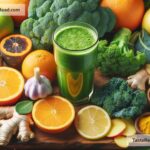Foods That Promote Lung Elasticity: Breathing Easier Through What You Eat
Your lungs are amazing organs that allow you to breathe, delivering oxygen to your body and helping you stay alive and energized. However, many factors, like aging, pollution, smoking, and certain illnesses, can weaken your lungs and reduce their elasticity. Elasticity is the lungs’ ability to expand effortlessly as you inhale and contract as you exhale. When elasticity decreases, breathing feels harder, and the lungs may struggle to perform their job efficiently.
The good news is that the foods you eat can make a difference. Certain nutrients found in everyday foods can help strengthen the lungs, improve elasticity, reduce inflammation, and support overall respiratory health. Here’s an easy-to-understand guide to foods that promote lung elasticity and keep your lungs healthy.
1. Fatty Fish: Rich in Omega-3s
Fatty fish like salmon, mackerel, sardines, and tuna are an excellent source of omega-3 fatty acids. These healthy fats reduce inflammation in the lungs and help maintain the tissues’ elasticity. Omega-3s also support the immune system, making it easier for your body to fight off infections that could harm your lungs.
If you’re not a fan of fish, you can get omega-3s from other sources like walnuts, flaxseeds, and chia seeds.
2. Citrus Fruits: Packed with Vitamin C
Oranges, lemons, grapefruits, and limes are rich in vitamin C, a powerful antioxidant. Vitamin C strengthens lung tissues, reduces damage caused by free radicals, and boosts your immune system. This is especially important because strong lungs are less likely to lose elasticity over time.
Additionally, vitamin C helps the body produce collagen, which is a key protein that supports the flexibility and strength of lung tissues.
3. Leafy Green Vegetables: Loaded with Antioxidants
Spinach, kale, Swiss chard, and other leafy greens are packed with antioxidants like beta-carotene and lutein. These nutrients protect the lungs from harmful substances and reduce inflammation, keeping them flexible and strong.
Leafy greens are also rich in magnesium, which plays a role in relaxing the muscles around your airways. This makes breathing easier while ensuring your lungs maintain elasticity.
4. Apples and Berries: Nature’s Lung Protectors
Apples and berries (such as blueberries, strawberries, and blackberries) contain flavonoids, natural compounds that reduce lung inflammation and oxidative stress. They’ve been linked to improved lung function, making them excellent choices for respiratory health.
Apples, in particular, contain quercetin, a flavonoid believed to protect the lungs from damage caused by pollution and smoking.
5. Nuts and Seeds: Full of Vitamin E
Almonds, sunflower seeds, and Brazil nuts are great sources of vitamin E, another powerful antioxidant. Vitamin E is known to protect the lungs against oxidative damage and help improve overall lung elasticity. It also strengthens the immune system and reduces inflammation, both of which are vital for healthy lungs.
6. Ginger: A Natural Anti-Inflammatory
Ginger doesn’t just add flavor to your meals—it’s also a lung-friendly food. Ginger contains compounds called gingerols that reduce inflammation, improve blood circulation in the lungs, and promote lung tissue repair.
Adding fresh ginger to your tea, soup, or stir-fry is an easy way to support lung health and improve elasticity.
7. Green Tea: Full of Polyphenols
Drinking green tea can be a simple way to support your lungs. Green tea is rich in polyphenols and catechins, natural compounds that reduce inflammation and protect the lungs from damage. Regular consumption of green tea may help preserve lung elasticity as you age.
8. Tomatoes: High in Lycopene
Tomatoes are an excellent source of lycopene, an antioxidant that improves lung function and reduces airway inflammation. Lycopene helps keep lung tissues flexible, allowing them to expand and contract smoothly.
Whether you eat tomatoes in salads, sauces, or soups, they’re easy to incorporate into your meals.
9. Garlic and Onions: Natural Detoxifiers
Garlic and onions contain compounds like allicin, which have natural anti-inflammatory and detoxifying properties. They help reduce mucus buildup and improve the lungs’ ability to function efficiently. Regular consumption of garlic and onions is linked to better lung elasticity.
10. Water: Essential for Elasticity
While it’s not technically a “food,” water is essential for keeping your lungs hydrated. Dehydration can make lung tissues less flexible, so staying properly hydrated is important. Drinking enough water daily helps your lungs stay elastic and clear of mucus.
Habits Matter Too
While eating these lung-friendly foods can help, don’t forget that lifestyle choices also affect lung health. Avoid smoking, limit exposure to air pollutants, and exercise regularly to keep your lungs as healthy as possible.
Conclusion
Your lungs work tirelessly to keep you breathing, and taking care of them is vital for a long, healthy life. Including foods like fatty fish, citrus fruits, leafy greens, nuts, and berries in your diet gives your lungs the nutrients they need to stay elastic and strong. Pair these foods with good hydration and healthy habits, and you’ll be breathing easier in no time!
Remember, the journey to healthier lungs starts with simple changes to your plate. Give your lungs the love they deserve—they’ll thank you by helping you breathe deeply and live fully!


